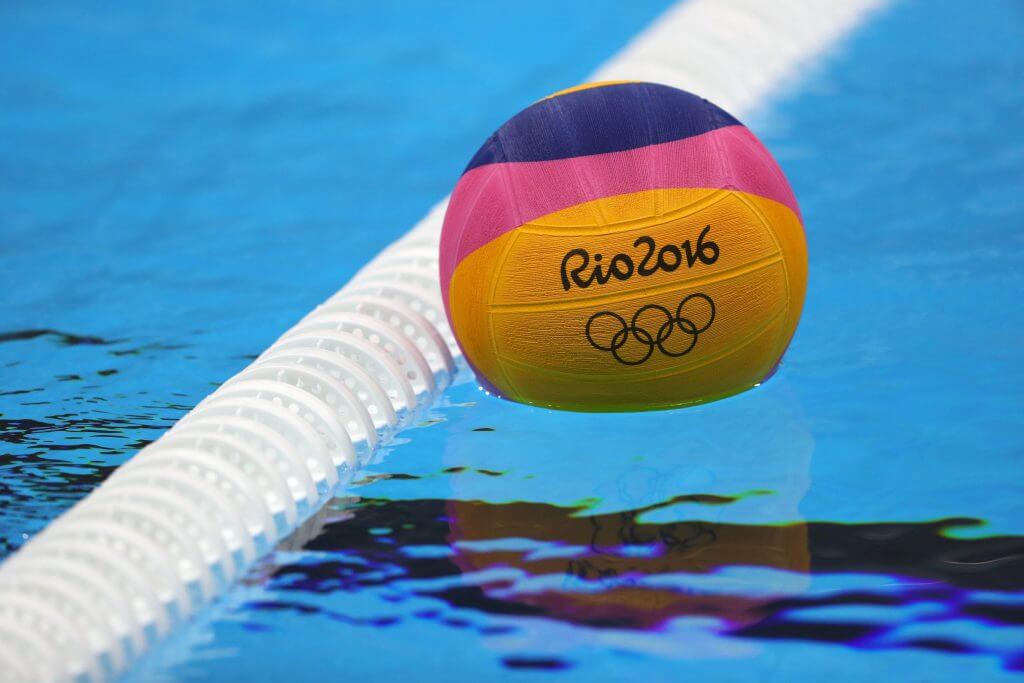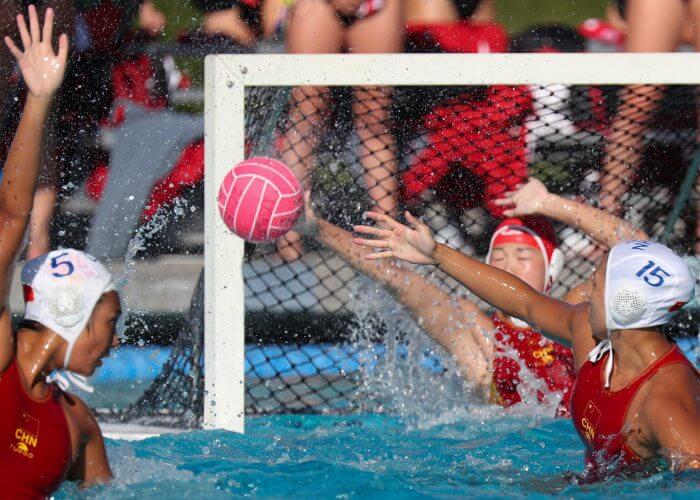Kazakhstan’s Andrey Kryukov On the Coronavirus Crisis: “I Believe the Sports World Will Survive”

In contrast to a blogosphere super-charged by statements yesterday from Dick Pound—a senior International Olympic Committee (IOC) member who suggested that the 2020 Tokyo Olympics may prove too dangerous to hold—Andrey Kryukov has provided Swimming World with an exclusive behind-the-scenes look into how Olympic sports are being disrupted world-wide by the novel coronavirus outbreak.
[Tokyo Olympic Games: Cancellation D-Day Late May Over “New War” Coronavirus, Says Dick Pound]
Kryukov, who for the past year has been president of the Swimming Federation of Kazakhstan, is also a FINA bureau member and liaison to their Technical Committee of Water Polo (TWPC). In that capacity he’s been involved with a series of rule changes for polo competition at the 2020 Games.
As a vice president of Asian Swimming Federation he was a key decision-maker when they agreed early this month to cancel the 2020 Asian Qualifications for men’s and women’s polo. Protest from this decision—made because the Kazakh government was concerned about the dangers of COVID-19—came from the decision to award Olympic berths in the Tokyo Games to the Kazakh men and the Chinese women.
Responding to a series of questions from Swimming World, Kryukov explained the seriousness of the coronavirus outbreak—what he termed a “worldwide epidemic crisis”—and underscored just how real the threat is to the world’s most prestigious athletic competition.
– Iranians have complained that it was unfair Kazakhstan was awarded a spot in the 2020 Olympics men’s water polo field after refusing to host the Asian water polo qualifying tournament. As Secretary General for the Swimming Federation of Kazakhstan, how do you respond to this charge?

Andrey Kryukov. Photo Courtesy: FINA
I haven’t received any complaint from the Iranian Swimming Federation. I understand that some representatives of the Iranian Swimming Federation were said to not be happy with the decision of the competent bodies of AASF (Asian Swimming Federation) and FINA to apply the ranking of the Asian Games 2018 to determine the women’s and men’s teams that will represent the Asian continent at the Olympic Games 2020 in Tokyo, as well as the four teams that will continue to compete for licenses, in view of the exceptional circumstances caused by the Coronavirus crisis.
I want to note that in Asia we are all unhappy and saddened by the situation and the fact that we had to accept and agree with such a decision. I want to remind you that the women’s team of Kazakhstan lost the chance to qualify from the continent and our federation is forced to accept these circumstances, guided by the common sense and common interests of the continent, despite the pressure of media, water polo enthusiasts and other circumstances in our country.
In view of our Federation, we simply must highlight that the Swimming Federation of Kazakhstan had made all arrangements and was indeed ready to host the Asian water polo qualifying event. Accordingly, it is not correct to say that Kazakhstan has refused to host the event. Everything was ready: ten teams had confirmed their participation, visas and flight tickets have been issued, hotels have been booked, all competition materials have been prepared etc. The Organizing Committee incurred huge expenses to properly prepare the event.
[Coronavirus Claims First Tokyo Olympic Victim: 2020 Asian Water Polo Championships]
Following the statements made by international experts and the WHO in connection with the Coronavirus, on 29 January the Government of Kazakhstan decided to postpone the qualifying event by two weeks, with February 26 as new starting date. This was in line with the requests of several participants. One day after the decision of the Government of Kazakhstan, the Singapore Swimming Association expressed its concern that its athletes would have to play with teams from China, and submitted that there was a potential, serious risk of coronavirus infection. The Organizing Committee has been asked to share the safety precaution in place for the competition to minimize the risk.
Thereafter, the Iran Swimming Federation sent an official letter to the Organizing Committee expressing their apprehensions and worries for their athletes in light with the newest developments of Coronavirus epidemic, where was clearly stated:
“Our medical sports Federation & Ministry of Sports highly recommends not traveling or being in touch to Chinese neighboring countries and people in addition to China…”.
Later, on February 7, the teams of Japan and Singapore cancelled their participation, before any decision had been taken by the AASF. At that time, all parties understood that there is a great risk of infection of athletes during their way to Kazakhstan, and all related consequences.
We understand that the main objective of AASF’s decision was the health and safety of all athletes and officials—not any other reason. To our knowledge, AASF originally wished to be able to relocate the qualifying event, but it proved to be impossible to find a new host and organize everything within a very short time-frame.
Considering the extraordinary circumstances currently existing, and similar to other sporting bodies, the Asian Swimming Federation had to make an important decision; protecting the health and safety of all athletes [while] taking in due considerations the risks of the Coronavirus epidemic crisis. In this very difficult situation, it was necessary to take a decision that would allow [us] to identify six teams and—at the same time—would be based on objective criteria [that] would protect the interests of the Asian family.

Photo Courtesy: M. Randazzo
Therefore, the decision of using the ranking reached by the teams at the Asian Games 2018 was the only possible decision in such difficult situation.
In particular, it was not possible to introduce a series of individual qualifying to determine six teams. There was simply no time to carry on such matches, and the developments of the Coronavirus crisis including the increasing travel restrictions worldwide, did also made such a solution impossible to be implemented.
It was not AASF’s intention to cancel the qualifying event. the decision was taken due to extraordinary circumstances, which [are] beyond the control of AASF and the Organizing Committee.
Moreover, I would like to note that all participants of the Asian Water Polo Championship supported this decision of the AASF. It appears that only the Iran Swimming Federation did not recognize the decision—and the risks of this worldwide epidemic crisis.
It should be noted that more than 100 other sporting competitions have already been canceled or postponed in mainland China, as well as in other countries of Asian region and even in Europe. Today many international federations faced difficulties in holding qualifying championships for the Tokyo 2020 Olympic Games.
– How was the decision to cancel made? Is it because the Chinese athletes were at risk for the coronavirus? Or, was the Kazakh government concerned that bringing in people outside the country is what posed a risk?
As you are aware, the situation with Coronavirus is very difficult, and since Kazakhstan is bordering with China, the Government had to adopt additional protective measures to prevent the spread of Coronavirus in Kazakhstan.
Kazakhstan has shut down transport links with China over Coronavirus fears and the Government has also provisionally suspended the issuance of visas to Chinese citizens. The same applies in other countries.
The Interdepartmental Commission under the Government of the Republic of Kazakhstan held an emergency meeting and recommended to cancel the Asian Water Polo Championship in Nur-Sultan (Please see the attached press release by the government for your reference https://primeminister.kz/en/news/informacionnoe-soobshchenie-dlya-smi).
Accordingly, the Organizing Committee has arranged a series of meeting with the relevant government authorities to review any possible decision and explore any possible alternatives for the event. However, the Government, taking in consideration the risks and the latest developments at international level, has decided to strictly implement travel ban and cancellation of events to counteract the risk of spreading the virus in the country.

Chinese women didn’t get to compete in Kazakhstan—but they qualified for Tokyo. Photo Courtesy: Catharyn Hayne
The Government of Kazakhstan announced publicly that as of February 20, 2020, travelers arriving in Kazakhstan from coronavirus-affected countries will be divided into three categories depending on the situation in the country, where they come from. Preventive anti-epidemic measures will be carried out depending on which category the country belongs to.
Individuals arriving from or who have visited China will be quarantined for 14 days from their last day in China in an isolated hospital unit.
Individuals arriving from countries where more than 10 cases of coronavirus have been registered will be placed under mandatory health monitoring at their place of residence for 14 days.
This is where we are now.
– The Iranians, Chinese and South Korean men are now able to compete in qualifiers next month in Europe. How realistic is it for this to happen—and how can they expect to compete with top European nations? Would they all be in the same draw for spots or would they be given special consideration?
It seems that the world qualification tournaments for the Tokyo 2020 Olympic Games will be held in Europe, and any team that is entitled to participate can compete for licenses. However, whether the Coronavirus crisis may have an impact on such tournaments cannot be predicted today.
From a sporting point of view, it is certainly true that the level of European teams is generally very high and therefore participating Asian teams may encounter difficulties. Whether the participation to such an event will raise issues of health and safety, we don’t know. But the decision to allow some Asian teams to compete in a World FINA qualification is without any doubt a fair decision, looking again at the extraordinary circumstances that international sport is currently facing.
As for our Federation, I can say that the women’s team of Kazakhstan, which has lost the chance to qualify from Asia due to the cancellation of the qualifying competitions in Kazakhstan, plans to compete in Trieste, unless the Trieste event will be affected by Coronavirus crisis.

Photo Courtesy: Xiong Qi/Xinhua
The Chinese teams were in a very difficult situation because of the Coronavirus, and their decision to support the AASF and the decision taken by the AASF against the Chinese teams deserves the utmost respect. They have a very difficult situation inside the country and they have been far away from their families for a long time. Nevertheless, no criticism was heard from the China Swimming Association, despite the fact that their men’s team lost the chance to compete for the quota of the Asian continent. This is a sign of the high level of development of organization, the ability to participate and accept collective decisions, guided by the principles of mutual understanding and common responsibility, not only thinking about their own courtyard.
– Also of note; will the Chinese—who likely had the best shot of upsetting the Kazakh men—be permitted to participate in the Netherlands competition? Is the fear of their possible exposure to the coronavirus such that they will be excluded essentially because of their nationality?
The competition in Kazakhstan was cancelled not because of the Chinese, but because of the governmental measures taken by the Government of Kazakhstan, so as by many other governments in the world, to try to limit the spread of the Cortonavirus. Looking at the high numbers of daily infected people and deaths, in particular at the numbers of country like South Korea, Singapore, Japan and China, we understood this decision, so as basically all concerned federations.
Whether or not China will be able to compete in the Netherlands is not an issue for us neither to comment nor to decide. The daily increase of infected people, deaths and concerned countries does of course worry everybody.
– It’s hard to fathom the impact of this disease from the vantage point of North America. How pronounced is the fear in Kazakhstan of the coronavirus spreading?
In our country, the land borders with China are more than 1,500 km. It is therefore obvious that the real risks are much higher than if you are 7,000 kilometers away and watch everything on TV. I think that the decisions of [the] Kazakhstan Government are not based on fear, but on WHO recommendations, common sense and concern for the health of citizens.
If you follow the media releases over the past month, you will see that the situation inside our country is very complicated and there were protests in the areas directly bordering with China. People demand the adoption of urgent security measures. Therefore, the Government’s reaction seems appropriate to us, so as similar unprecedented measures and decisions that have been taken by other governments, like this week for example by the Italian Government. It is simply very clear that sporting events bear substantial risks in terms of possible spread of the Coronavirus, and this is why we see in several countries that events are cancelled. There are national and international policies to be followed and to be applied in such epidemiological situations, so one does need to trust the professionals and act accordingly.
– There is now talk that the Tokyo Games may be moved to London for safety reasons. How realistic is the idea that the 2020 Olympics will take place outside of Asia?
I prefer to leave to the IOC and the IOC Members to comment on the Tokyo 2020 Olympic Games, they know real situation much better. In conclusion, I want to quote one of my Hungarian colleagues Tamas Gyarfas from FINA, who wrote the following short message to FINA Bureau:
While I also consider the athletes’ safety the most important principle, I need to point out that cancelling this tournament really harms the spirit of sport. There might have been teams which considered the Asian Games as a firm base for building a great team for 2020 and may have targeted the qualification tournament as an event where the team would reach peak performance. This development process might be ruined and this brings me to the conclusion that from the sport’s point of view it is a disaster that we should face the cancellation of these tournaments.
Still, in the given circumstances, it seems there is no other option than to consider the Asian Games as the qualification tournament.
These words accurately reflect our condition and the opinion of most of us, and unfortunately the extraordinary reality that we encountered.
Lately, the Organizing Committee has received a number of letters of support. I take this opportunity to thank everyone for their kind words and support.



